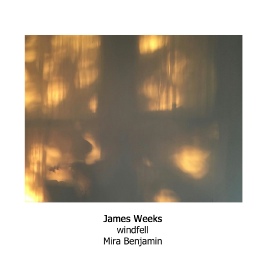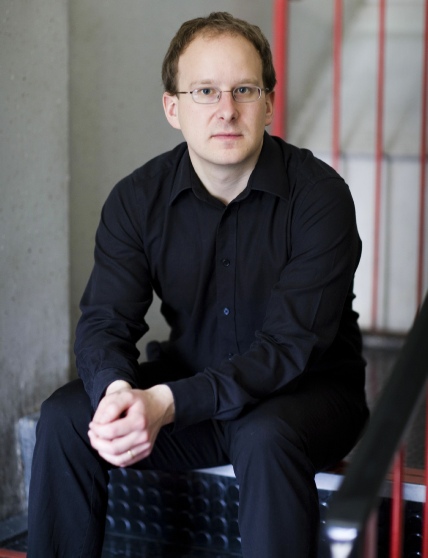Another Timbre TimHarrisonbre

at139 James Weeks ‘windfell’ (2017) 59:40
An hour-long piece for violin and voice, written for and performed by Mira Benjamin.
Interview with James Weeks
Could you tell us about your background in music and how you came to experimental composition?
I received a very traditional English musical education, starting early (I was a cathedral chorister as a child, which was an amazing foundational experience, not only musically), and I knew I wanted to be a composer from the time I was about 8 or 9. I've never thought seriously about doing anything else instead, though of course other things have become important alongside that, particularly conducting. To begin with I loved Renaissance polyphony because that was what we sang in the cathedral, and its intricacy and richness fascinated me. Whenever we did some modern music my ears pricked up too, and I soon found that I didn't share my friends' disparaging comments about it and began to seek it out. By the time I was in my mid-teens I was a confirmed new-music fanatic and composing prolifically. I had a lot of encouragement at school and through my piano teacher I encountered Michael Finnissy at age 17. I spent a year out before university studying with him and four more years with him as a postgraduate, and his teaching and example were what opened the door for me as an artist. He taught in a very holistic way, which suited me, so that learning to compose was never just about the notes on the page and whether they sounded 'effective' (and what did that mean anyway?) but was about Life and everything in it. For me at that time, having passed through a brief phase of complex writing I gravitated towards Cage and experimentalism more generally. Composers like Aldo Clementi, Chris Fox and Chris Newman became important to me then, and I found a lot of freedom and creative excitement in the conceptual spaces between traditionally notated and improvised music, as well as through paring down my materials to the bare minimum (a deliberately assumed 'anti-complexity', which nevertheless didn't rule out the creation of music that was overall complex and multi-layered). I am still happy to make different kinds of work with different kinds of notation in different ways: I've been particularly engaged with making flexible, indeterminate scores with a lot of text instructions for CoMA in the last 4 years, but alongside that I've made pieces that are completely notated, and in great detail, such as the Just Intonation pieces and a madrigal book in 1/5-tones. Early on I was happy to make each piece sound very different from the previous one, but recently I've noticed myself wanting to continue exploring similar materials from piece to piece, some of which appear in windfell, and always to make listening 'fields' in which the listener can aurally wander rather than leading them along a particular path. I'm not really sure if I'm an ‘experimental’ composer but I would say that my work in general is concerned with speculation, of exploring the unknown, of not-knowing-in-advance, which I suppose is an 'experimental' attitude.
How did 'windfell' come about?
windfell came about because of Mira. She got in touch after we had worked together when she played with the Bozzinis and suggested I make her a long-duration piece. I have written a lot for the violin (my wife is a violinist, in fact) and love the instrument, so the challenge of making something for a single player over the span of an hour was maybe slightly less daunting than trying to do that for an instrument I didn't know so well. Even so, an hour is a crazy amount of time for one player and I spent a long time before I started, trying to imagine what I could do to fill it. (It definitely felt like filling a span of time: time was always a part of this music, almost like time and music were two polyphonic lines making up the piece.) I decided quite early on that I needed to find ways to enrich the timbral and harmonic palette over the course of the hour, and found an answer by considering it as a piece for Mira rather than a piece for violin: so we experimented with singing and whistling and discovered she has a lovely soft singing tone that can blend (and tune) with the violin, creating the long sequences of Just Intonation three-part chords in the second half of the piece. For me the music is inseparable from the player - she doesn't disappear into the music but is foregrounded by it, even though it is in some ways very abstract and rarefied material, requiring an almost 'inhuman' control, one might say. But this is the subject of the work, the human and the inhuman (or not-human), the inside and the outside, our experience of being human and the way we place ourselves within and relate to the 'natural' world outside and around us.
I find the title nicely evocative, but where does it come from and what does it refer to?
It came about through an image I had of the violin surrounded by space and open air: on top of a hill, high-up and remote, played only by the wind. This is the ‘wind fell’, (‘fell’ in the Northern English sense) where the breeze moves over the instrument’s surfaces, setting the open strings in motion, and leaves brush across the strings as the wind catches them. The whole opening section is imagined as a sounding-out of the instrument, its body and materials, by the environment in which it rests; only later does the human presence of the player get foregrounded in the work. As I say, I’m really interested in this idea of indwelling within the world around us, so (in my mind at least) the piece explores a liminal space where the player keeps disappearing into this ‘natural’ environment and reappearing again – not in any narrative sense of course, but philosophically speaking. Overall I think the feeling of being in a certain ‘place’ as well as time comes across in listening to the piece – so the title may help to transport listeners to this imaginary place.
Earlier you spoke of a shift in your work from complexity towards Cage and experimentalism, which is a trajectory that I think quite a few composers and musicians have shared in different ways. Why do you think that has happened? And do you still feel engaged in that process, or has it run its course for you personally, and do you now feel on the edge of another shift?
I think you’re right, this particular move from one radical position to its (apparently, but not necessarily) opposite extreme seems to have happened to a number of composers; to try and put it in context as part of a general shift, I’d guess that for young composers naturally drawn to the most exploratory, maybe extreme, certainly speculative, ways of making music there seems to have been a gradual change in the wind over the last few decades, maybe longer, where the radical edge of Complexity has gradually lost the sharpness it had in the 70s and 80s, and the excitement about creating, performing and hearing this music (which is difficult to write and difficult to play, and is mostly appreciated by small groups of cognoscenti) had been superseded by other types of sonic and aesthetic exploration. And meanwhile this wonderfully refreshing (and not so difficult, though as deeply rewarding) experimental repertoire from the 50s, 60s and 70s was experiencing a revival and seemed to open up paths for further exploration in so many different directions. For me this was all happening as I was coming of age as a composer and realising what was and wasn’t ‘me’, and I discovered that what made me happy and at one with the world was to make this much more conceptually and stylistically open work. I embraced very sparse materials, notational experimentation, indeterminacy, and gradually found a way of writing that I think probably contains all of me. To answer your question about where I am now, I would say that I haven’t felt consciously engaged in a process of leaving complexity for experimentalism for more than 10 years – I think I’ve just gone deeper and deeper into the materials and ways of making music that interest me. I don’t think I’m on the edge of another shift, in fact I feel I’ve found so much to occupy me among my present concerns that what I really want to do now is just make a lot more work. Like many composers I’ve struggled to find the working time and conditions to write consistently, I’ve never got onto the international residency circuit or anything like that, but I have a job now [at Durham University, UK] which ought to allow me to find a rhythm and do a lot more in the next few years. That’s the hope, anyway. Life has a way of throwing the unexpected into your path so I’m not going to get too far ahead of myself… Just enjoy writing, and working with wonderful musicians like Mira Benjamin.
